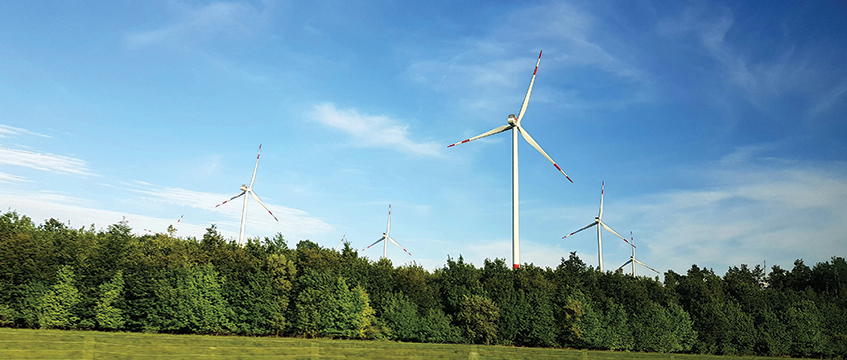Shades of green in renewable energy procurement
When it comes to the E in ESG, attention mainly focuses on the efficiency of buildings. But is it time to start a bigger conversation about the electricity that supplies them?
For landlords looking to decarbonise their portfolios, one of the biggest steps they can take is to ensure that they are powered by renewable sources, and perhaps the best way of doing that is to use corporate power purchase agreements – long-term agreements that not only lock in energy pricing but also enable new renewable capacity to enter the market.
In an EG session looking specifically at the role of renewable energy procurement in decarbonising the property industry, flex operator Workspace Group talked through its journey in adopting a CPPA and the obstacles and benefits that came with it.
When it comes to the E in ESG, attention mainly focuses on the efficiency of buildings. But is it time to start a bigger conversation about the electricity that supplies them?
For landlords looking to decarbonise their portfolios, one of the biggest steps they can take is to ensure that they are powered by renewable sources, and perhaps the best way of doing that is to use corporate power purchase agreements – long-term agreements that not only lock in energy pricing but also enable new renewable capacity to enter the market.
In an EG session looking specifically at the role of renewable energy procurement in decarbonising the property industry, flex operator Workspace Group talked through its journey in adopting a CPPA and the obstacles and benefits that came with it.
Stepping up
The session was chaired by Shoosmiths real estate partner Liz McKillop Paley, an investment and development lawyer for renewable energy projects. Tesco, she said, had recently signed the UK’s largest CPPA, through which it will source 10% of its power from a solar park in Kent.
“It makes perfect sense, doesn’t it? Reduce greenhouse gas emissions associated with the operation of buildings by incorporating renewable energy sources into the electricity supply to that building,” McKillop Paley said. “But how?”
Workspace had been on a renewable tariff since 2019, courtesy of a renewable energy guarantees of origin-certified contract, but it wanted to take things a step further. The company’s head of sustainability, Sonal Jain, said: “Signing a 100% REGO-backed tariff is no longer deemed high-quality. There are shades of green when it comes to procurement and we wanted to upgrade ourselves.
“This is where we were actively looking for a solution in the form of a CPPA so that we could claim we have a higher-quality renewable tariff.”
Workspace signed a 10-year CPPA last December under which two-thirds of its electricity comes from renewable sources. Jain added that the company is now looking at renewable options for the remaining third of its power.
Be the change
“What signing a CPPA has allowed us to do is take a step further on our net-zero journey,” Jain said. “It has provided us with additional green power which is deemed a higher quality because the plant we have opted for is ‘new-to-earth’, which means by us closing that deal we have enabled 20MW of power to come online to the UK grid.
“This has allowed us to reinforce the credibility of our net-zero approach and build consumer trust in our climate transition plan.”
She added that anyone looking to follow suit will have to overcome issues around credit-worthiness and ensuring the contract is watertight, but she believes the process is worth it.
Workspace operates 70 buildings across London and the South East. Jain said there are concrete commercial benefits to the CPPA, not just in fixing energy pricing but in meeting customer demand.
“We are exposed to highly sustainability-minded customers,” said Jain. “We cater to 4,000 businesses in London’s SME market, and our recent survey showed that more than 88% of our customers value sustainability highly.
“Nearly 70% of our customers have set their own sustainability and net-zero ambition, so they expect more of us. They expect us to lead with a genuine agenda and a genuine climate transition plan.”
Power hungry
One of those customers is Formation Architects, whose director Marco Tomasi said he welcomes the CPPA as a useful step in its move towards B Corp accreditation. It has also made his company think more broadly about the issue of power.
“The whole conversation about the CPPA made us look at it from a slightly different perspective, and we are now looking at all our cloud storage facilities and how they source their energy, because they are a lot more power hungry than we are as an office,” Tomasi said. “We are reconsidering all our suppliers because of that.”
Jain added that by getting on board, the property industry can effect broader change. “The latest Climate Change Committee report states that 60% of national electricity demand comes from buildings, so our sector is uniquely positioned to provide that demand signal for the grid to decarbonise,” she said. “As owners of commercial real estate, we are uniquely placed to adopt models like CPPA and accelerate the decarbonisation of the grid.”
In partnership with
Photo © Camila Fernández León/Unsplash











